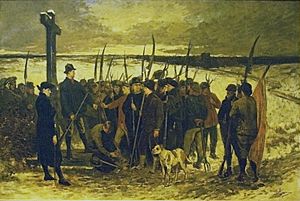Battle of Billericay facts for kids
Quick facts for kids Battle of Billericay |
|||||||
|---|---|---|---|---|---|---|---|
| Part of Peasant's Revolt | |||||||
 "The Peasant War" by Constantin Meunier |
|||||||
|
|||||||
| Belligerents | |||||||
| Royal Forces | Rebel Forces | ||||||
| Commanders and leaders | |||||||
| Thomas Percy | Unknown | ||||||
| Strength | |||||||
| Unknown | Unknown | ||||||
| Casualties and losses | |||||||
| Unknown, Minimal | Around 500 | ||||||
The Battle of Billericay took place on 28 June 1381 when the boy King Richard II's soldiers defeated the Essex rebels adjacent to a wood north-east of Billericay, part of the Peasants' Revolt. This is likely to have been Norsey Wood, which maps of 1593 show to cover the same extent as in the early 20th century.
After the death of Wat Tyler and dispersal of the main rebel army, a summons was sent out in Essex for a mobilisation of rebels at Great Baddow and Rettendon, at threat of arson. Hundreds met and gathered in North-East Billericay on the 27th of June, digging trenches and chaining carts together.
The King's forces were led by Thomas of Woodstock, the Earl of Buckingham and Sir Thomas Percy. They charged the defensive line as broke it, as the rebels struggled to form a defensive line. Some stayed behind and formed a Saxon fighting ring, as many ran and fled into the woods itself.
It is thought that 500 Essex men were killed and buried at Great Burstead churchyard, and 800 horses were captured. The few survivors who didn't desert tried in vain to rally the people of Colchester to fight, and then to Sudbury, only to find hostile Royal forces. The last survivors then made their way to Huntingdon before making a last stand at Ramsey Abbey where 25 were slain and the remainder became outlaws.
The details comprising this overview have been summarised from a piece written for the Norsey Wood Society newsletter by Billericay historian Julian Whybra
His ultimate sources were the Westminster Chronicle attributed to Robert of Reading, and the Historia Anglicana by Thomas Walsingham.

